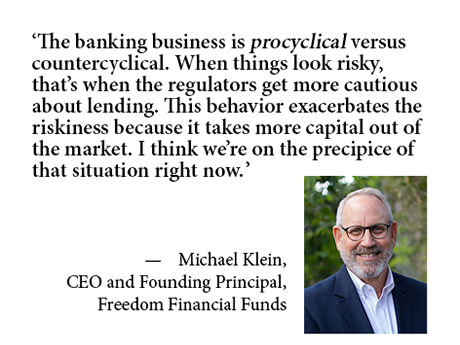Prospective investors can finance acquisitions even when equity is scarce, explains Michael Klein, CEO and founding principal of Freedom Financial Funds. “The scarcity of equity is an old phenomenon; it’s a relatively new phenomenon that made equity plentiful. For most of history, it was hard work to find equity. However, even in a tight market, if there’s a compelling case for a project to result in success and there are multiple ways of protecting the equity and the debt, that deal will get done.”
This is the outlook Klein brings to the 2023 MBA Commercial/Multifamily Finance Convention & Expo. Klein’s company, Freedom Financial Funds, LLC is a private REIT based in Los Angeles and operating in the western United States. The REIT specializes in providing capital to real estate professionals adding value to projects.
Debt, Equity and Protecting Value
Klein explains that with any type of financing, whether it be debt or equity, it is key to have a compelling story and facts to indicate that the borrower is going to provide a fair amount of value. “Protecting the investor from potential downside risks is an essential part of financing,” explains Klein. This sort of forethought requires thorough due diligence to fully understand the logic behind each loan.
Klein elaborates that, as a rule, the worst investments are made when money is easy to obtain because people are optimistic, willing to take on more risk and less inclined to review everything carefully to ensure success under all conditions. “But when money is really scarce, the best investments are made,” says Klein.
Loan Trends and Caution in the Marketplace
Aversion to risk has made loan structuring much more conservative. Higher interest rates clearly make profitability more difficult to achieve due to the added cost of capital. But Klein explains that banks are also under pressure to tighten their lending standards.
Tighter lending standards arise under a number of circumstances that Klein enumerates, including increased reserve requirements amongst banks. “The banking business is procyclical versus countercyclical. When things look risky, that’s when the regulators get more cautious about lending. This behavior exacerbates the riskiness because it takes more capital out of the market. I think we’re on the precipice of that situation right now.”
Combined with interest rates increasing, Klein says “The tightening of bank lending creates a cascading effect — a fair number of private funds are reliant on bank lines to make their yield. Private funds are reliant on warehouse lines and those warehouse lines are getting more challenging to keep — meaning that some of the private funds will be disappearing. Finally, as we enter into earnings season, accounting auditors will be looking out for unrealized losses, impacting the amount of capital that a bank has to make loans.”
“Over the course of the near term, capital is going to be more scarce, generally, although we are seeing reports that there is lots of money on the sidelines. But it’s not available yet.”
Appetite for Bridge and Construction Loans
Because Freedom Financial Funds funds their projects with equity dollars, they are interested in plans that can work even under pressure. “We’re still seeing a lot of deals without a well-defined Plan B. So, it is challenging to find good deals, but they do exist.”
For example, Freedom Financial Funds is currently working on a programmatic commitment to finance the construction of new retail outlets that are preleased to a credible tenant. Alternatively, Freedom Financial Funds is working with a client to bridge the lease up portion of its apartment project because its current bank does not want to extend the loan without a significant reduction in its loan exposure. The crucial point with this, and with all deals, is finding investments that work under a variety of economic conditions and that offer a persuasive plan.
— Freedom Financial Funds is a content partner of REBusinessOnline. For more information about the content partner program, click here.


